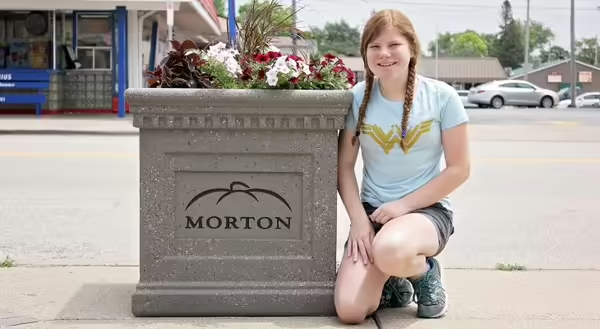
Morton Economic Development Council and Chamber of Commerce identified “the advancement of its economic development efforts” and the “creation of a livable community for all” as key priorities, and subsequently engaged with University of Illinois Extension and UIUC Department of Urban and Regional Planning in an applied research study. The study included community surveys, focus groups with key stakeholders, community case studies and analysis of secondary data. The study was part of community wide effort to ensuring that a “range of safe, quality, and stable housing options are available for residents of varying incomes” and “to attract new businesses to the community and prepare for economic development within the City and the region.”
Why Housing Matters
Housing is the foundation for communities. Quality housing plays a large role in local economies because it promotes positive health, education, and economic outcomes for the community. When housing prices rise too high workers tend to move longer distances from their jobs or leave the community. This creates longer commutes, increased traffic congestion, and slows economic productivity altogether.
Local businesses face severe ramifications of higher housing prices. Residents have less disposable income when housing prices rise and spend less on local goods and services. A lack of available housing keeps workers from living near their workplace, increases employee turnover, and raises the cost of recruitment and retention for local jobs.[i] Attracting a dependable workforce allows businesses to grow and invest profits back into the community. Housing-focused solutions in Morton offer an opportunity to stimulate economic development through cost effective approaches.
Project Outcomes
The study facilitated new conversations and strengthened relationships among key stakeholders, ongoing conversations will continue to inform and build strategies to strengthen local housing development as participants recognized the value of sharing information around changes in the housing landscape for their community. New educational and outreach programming has been created through this partnership to further strengthen the housing retail market.
Data and information gathered as part of this community study has resulted in a new housing model that will add another layer of desirable housing to Morton’s livability landscape. According to former Secretary of Transportation Ray LaHood, “Livability is about tying the quality and location of transportation facilities to broader opportunities such as access to good jobs, affordable housing, quality schools, and safe streets.”
On August 3, 2020 City of Morton approved the development of a multifamily housing unit which included amenities that contribute to the creation of livable community and offers flexibility to accommodate changing workplace or remote workforce.
Economic development is important to communities of all sizes. This project was finished as COVID 19 became a global pandemic. COVID 19 changed nearly every aspect of society and shocked the national economy as a deep, global recession appears likely. It will be extremely important to study the impact of COVID 19 on economic development and urban planning. Future research efforts need to be focused on understanding development during the recovery process, potential shifts to remote working, and the role of federal government support for local governments in times of crisis. The full devastation of COVID 19 to individuals and governments remains unknown.
MEET THE AUTHOR
As a community and economic development educator, Kathie Brown worked with community leaders, government officials, volunteer groups, small business owners, and others to help communities become stronger and more economically viable. She focused on leadership and organizational development; local government education and relations; economic development strategies; participatory community planning/visioning processes; group process facilitation; collaboration and partnership building; public issue education; and understanding, using and developing data.
Prior to retirement in 2021, Brown worked with organizations and local governments to help them: (1) analyze and understand their needs, (2) identify alternative courses of action, (3) make informed decisions, (4) plan for the future and (5) evaluate their development efforts.
Kathie worked for Extension for almost 40 years, contributing to programs related to community health, digital literacy, STEAM education, and more.
[i] Lisa Sturtevant, “Good Local Housing Policy is Good Economic Development Policy”, May 15, 2014. https://shelterforce.org/2014/05/15/good_local_housing_policy_is_good_economic_development_policy/